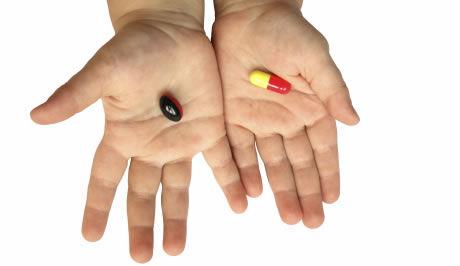Children and antibiotics: Parents sometimes reject them out of fear, warns pediatrician. How to serve them correctly?<
Antibiotics are intended for the treatment of bacterial infections, they do not work against viral infections. Consumption in the Czech Republic has grown by more than a fifth over the past 30 years. Most antibiotics are prescribed by doctors in outpatient clinics, mainly for respiratory tract infections. According to the findings of the State Health Institute, about half of these drugs are administered incorrectly. Overuse contributes to the fact that bacteria become resistant and stop responding to the drug.
“Antibiotics are only prescribed by a doctor, because only a doctor can recognize a bacterial infection and choose the most suitable medicinal product for a given disease for a specific patient. That is why it is completely inappropriate if patients ask for antibiotics in cases that are not indicated or in the so-called supply, which they subsequently prescribe themselves, or if they use antibiotics that they did not take from a previous illness, which is contrary to the prescribed treatment. Or they are even taking antibiotics that were originally prescribed for another family member. All these situations can lead to the danger of developing antibiotic resistance, due to which, with the incorrect use of antibiotics and insufficient development of new drugs, infections can become incurable for future generations," explains Mgr. Aleš Krebs, president of the Czech Chamber of Pharmacy (ČLnK).
Damage to the heart and joints
“If a doctor prescribes antibiotics for a sick person, it is important to take them exactly as directed. And in case of uncertainty, check with your pharmacist again. When dispensing antibiotics, pharmacists especially emphasize the fact that it is necessary to take the antibiotics at specified time intervals, and above all to always take the medicine after the time specified by the doctor. It is not possible to simply decide not to take further doses of antibiotics when the health condition first improves," warns Krebs.
According to Krebs, it should also be pointed out that if bacterial infections are not treated and patients, for example, refuse to take antibiotics, one of the possible serious complications of such irresponsible behavior can be rheumatic fever, which can cause serious damage to the heart and joints.
Recklessly administered antibiotics can harm children

When administering antibiotics to children, doctors and parents should be especially careful, both with the choice of antibiotic itself, the appropriate dose, the duration of administration, and with the repeated prescription of antibiotics at short intervals in a row. A child's organism reacts to the administration of antibiotics much more sensitively than an adult, and the reckless administration of these drugs can also have long-term consequences.
"Pediatric antibiotics have their specifics and their dosage is individual not only with regard to the weight of the child, but also the severity of the infection," said MUDr. Ilona Hülleová, president of the Association of General Practitioners for Children and Adolescents.
The soil is contaminated with drugs. A threat to nature? Antibiotics are the worst, report Czech scientists
The health condition and age of the child often require the use of effective treatment in the shortest possible time. In the case of pediatric patients, pharmacists prepare many medicines individually according to the specific needs of the child.
"Preparation of antibiotic syrups for children is an almost daily job of pharmacists. After dilution, the syrup can usually be used for only 7 days, the shortest possible time should elapse between the prescription, preparation and first use of the syrup. For this reason as well, it is important that the availability of pharmacies for patients is equal both in agglomerations and in smaller towns. For parents with sick children, the fact that they don't have to travel far for medicines and don't have to wait long for them, which is especially important for antibiotic treatment, is a significant help in the given situation," explains Mgr. Michaela Bažantová, pharmacist and press spokesperson of ČLnK.
Specificity of administration of antibiotics in children
- Respecting the method of administration with regard to diet (before meals, after meals, distance from administration of dairy products and mineral water or acidic foods). < li> Administration at regular intervals (after 6, 8, 12 or 24 hours).
- Sufficient drinking and rest regime.
- Storage of antibiotic suspension in the refrigerator (if required), shaking the suspension before each use.
- It is also important to monitor whether the child refuses or vomits the medicine.
- In some cases, choosing a different drug form will help, for example tablets instead of a suspension or vice versa< /li>
Influenza and covid in a boy (7) for the first time in the Czech Republic? Parents, protect your children, doctors say
Overuse and worry won't help
"Using antibiotics has its rules. Administer antibiotics responsibly to children so that they are effective not only for them today, but also for their children in the future. The overuse of antibiotics and unnecessary worries about their use are extremes that do not help anyone," adds Bažantová.
According to Hana Cabrnochová, the first vice-president of the association of children's practitioners, the cooperation of pharmacists with doctors treating children is essential. "It's ideal if their guidelines are the same," Cabrnoch said. Pharmacists can also consult with the practitioner about dosage or drug selection.
More than a thousand pharmacies in the Czech Republic will participate in an awareness campaign about the use of antibiotics next week. In the so-called antibiotic week, which is taking place for the eleventh time already, pharmacists want to focus on administering antibiotic drops, tablets or ointments to children. Parents or grandparents mainly want to teach. The event, which will last from November 15 to 21.


 Tags:
Tags: Prev
Prev







